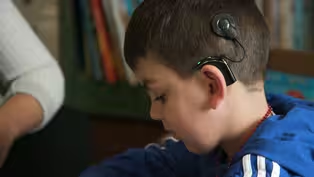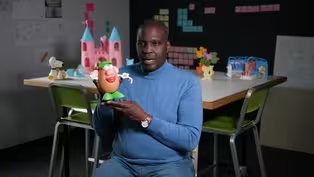
Breaking Good: Women and the War on Drugs
Clip: Season 4 Episode 14 | 7m 45sVideo has Closed Captions
Documentary exploration of the war on drugs and the high rate of women incarcerated.
A second look at this Rhode Island PBS original documentary by contributing producer and director Dorothy Dickie. Breaking Good explores the escalation of the incarceration of women in the United States since the war on drugs was declared back in the 1980s. We hear stories from two New England women who spent years behind bars and have turned their lives around.
Problems playing video? | Closed Captioning Feedback
Problems playing video? | Closed Captioning Feedback
Rhode Island PBS Weekly is a local public television program presented by Ocean State Media

Breaking Good: Women and the War on Drugs
Clip: Season 4 Episode 14 | 7m 45sVideo has Closed Captions
A second look at this Rhode Island PBS original documentary by contributing producer and director Dorothy Dickie. Breaking Good explores the escalation of the incarceration of women in the United States since the war on drugs was declared back in the 1980s. We hear stories from two New England women who spent years behind bars and have turned their lives around.
Problems playing video? | Closed Captioning Feedback
How to Watch Rhode Island PBS Weekly
Rhode Island PBS Weekly is available to stream on pbs.org and the free PBS App, available on iPhone, Apple TV, Android TV, Android smartphones, Amazon Fire TV, Amazon Fire Tablet, Roku, Samsung Smart TV, and Vizio.
Providing Support for PBS.org
Learn Moreabout PBS online sponsorshipwe launched our first subsidized housing program that housed 18 formerly incarcerated individuals and provided them housing vouchers to reunite with their families after incarceration.
(applause) Every time my phone rings, it's not good news.
This work is not easy to do, but when you have a chance to reunite a child, a mom, a dad, and put somebody who has been homeless for 10, 20 years, it makes it all work.
I grew up in Roxbury, Massachusetts.
I had a nice childhood, actually.
I grew up in a middle class family.
I can't complain.
We had a good upbringing.
I was an honor roll student.
I always had good grades, but my conduct was awful.
I ended up getting into fights in high school a lot, and me and my friends would all skip school.
We would go to my house and we would smoke weed and drink.
My first experience with drugs was when I was 13.
And so you experiment with things, very risky behavior when you're at that age.
Count to three, everyone say "new beginnings".
One, two, three.
- [Crowd] New beginnings.
- This is a long time coming, when women come back into communities that they actually have a home to come to, that they have the dignity and peace and love and support they deserve.
And that we are taking care of our people in our communities.
And so what we have today with the New Beginnings grand opening is a safe space for people to come to.
And we all owe our thanks and love and admiration to Miss Stacey Boyden.
(applause) - I'm the 11th child of 12.
Seven brothers, five girls.
Growing up was amazing.
It was just magical.
And on the other side, dysfunctional.
My two older brothers were drug addicted and in and out of trouble and police would always come.
And then there was me who was problematic, always high.
I was 11 when I first started smoking marijuana, and I wanna say 12 or 13 when I first sniffed cocaine.
My brothers were selling it.
It was more like the lifestyle I was suffering because it was a teacher.
And I remember sitting on her lap and I remember something happened and I blacked out.
I cannot recall what happened.
Back in hindsight now, I feel like something happened sexually.
I feel like that's where my early childhood trauma came from.
I started being a problematic child.
I was withdrawing, I really couldn't accelerate in school.
I just felt so incompetent and my comprehension level wasn't good.
And so once I got to JP High, it was drugs.
I started popping mescalin and microdots and sniffing Percocet.
All these years later, I never knew that I even existed.
And that's just how my life went.
Not feeling like I even existed.
I just floated.
And my senior year, I was sexually assaulted, and that took me over the edge.
I did know how to explain it to anybody.
I did know how to explain about the young childhood sexual assault or the young adolescent sexual assault.
I didn't know what mental illness was.
And so I started drugging heavily, and it was causing a lot of problems in the household.
And eventually I started running away and staying out and getting myself in trouble until my first incarceration.
That was in 1982.
- [Narrator] Right now in the United States, we know that there are over 6,000 women that are serving life sentences.
And so we need to think about for these women, what is the value of keeping them in prison forever?
What's lost in terms of for their family, for their community?
But also what do we lose by incarcerating people at a very high expense as they go into their old age?
- [Patricia] In FY21, the cost per offender in the female facility was about $187,000 a year.
Women have different issues that result in their incarceration.
They've had trauma in their lives that have contributed to their ultimate incarceration.
- Why did I deserve that, right?
And I didn't know how to process it.
- While women are incarcerated, they have a different experience.
- Because when I was in there, I held all that pain in because when you're incarcerated, there's so much drama going on inside the prison and that you're just trying to survive in there, right?
- Unfortunately, and it's something I'm working on very hard, resources, rehabilitative resources for the female population have not always been at the top of the page.
And so we're working very hard to change that.
- [Narrator] If the goal is to help a woman end her substance use problem and the consequences that she's imposing on her community because of her substance use problem and her role in the drug trade, if that's the goal, what else could we be doing to achieve that more effectively?
(gentle music)
Video has Closed Captions
Clip: S4 Ep14 | 13m 12s | An in-depth look at how language deprivation can cause deaf children to fall behind. (13m 12s)
My Take: Khipra Nichols on Toys
Video has Closed Captions
Clip: S4 Ep14 | 4m 56s | A toy designer behind Mr. Potato Head and My Little Pony shares his perspective on toys. (4m 56s)
Providing Support for PBS.org
Learn Moreabout PBS online sponsorship
- News and Public Affairs

Top journalists deliver compelling original analysis of the hour's headlines.

- News and Public Affairs

FRONTLINE is investigative journalism that questions, explains and changes our world.












Support for PBS provided by:
Rhode Island PBS Weekly is a local public television program presented by Ocean State Media

